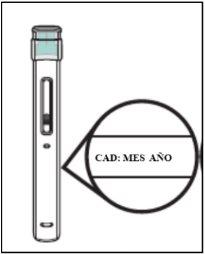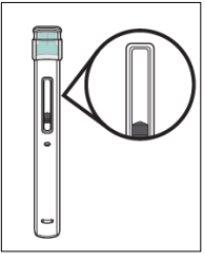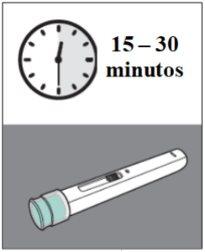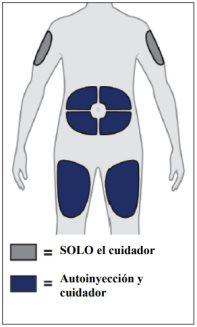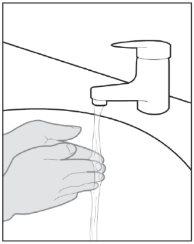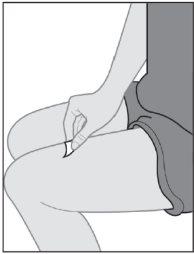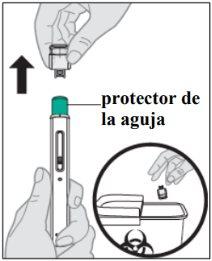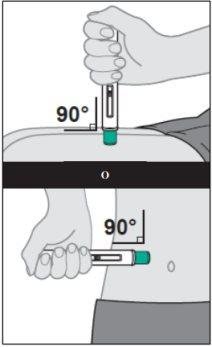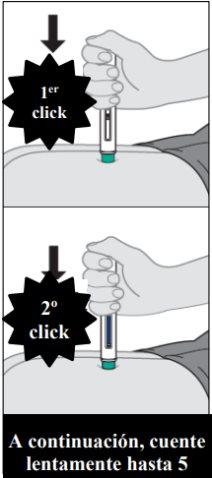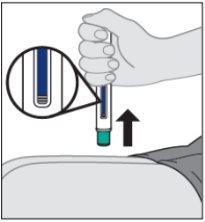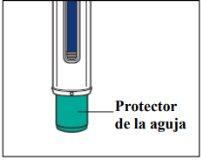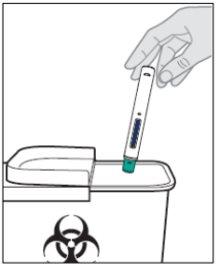
YUFLYMA 80 mg SOLUTION FOR INJECTION IN PRE-FILLED PEN
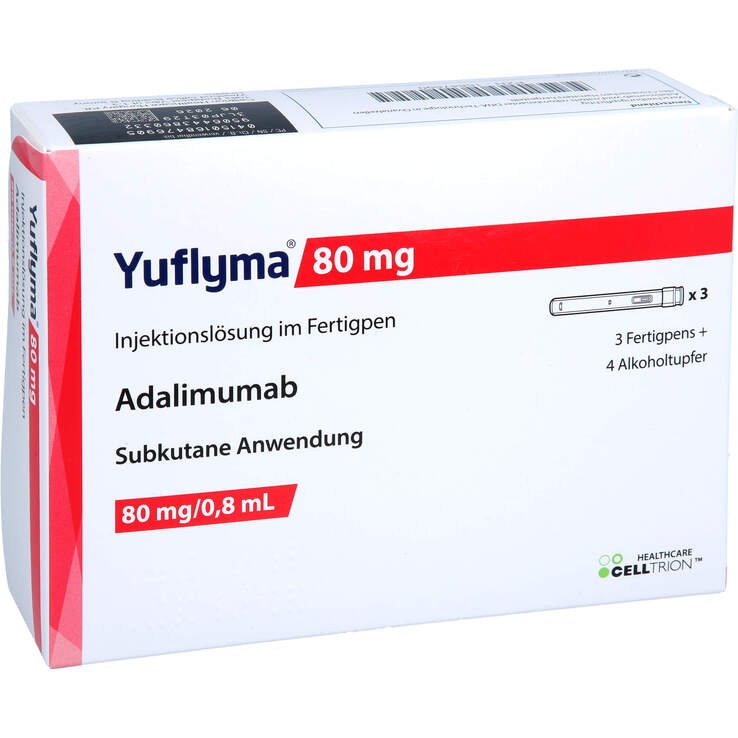

How to use YUFLYMA 80 mg SOLUTION FOR INJECTION IN PRE-FILLED PEN
Translated with AI
This page provides general information and does not replace a doctor’s consultation. Always consult a doctor before taking any medication. Seek urgent medical care if symptoms are severe.
Show originalContents of the leaflet
Introduction
Package Leaflet: Information for the Patient
Yuflyma 80 mg solution for injection in pre-filled pen
adalimumab
This medicine is subject to additional monitoring, which will allow for quick identification of new safety information. You can help by reporting any side effects you may get. The last section of section 4 will tell you how to report side effects.
Read all of this leaflet carefully before you start using this medicine because it contains important information for you.
- Keep this leaflet, you may need to read it again.
- Your doctor will give you a patient information card, which contains important safety information that you need to know before you start using and during treatment with Yuflyma. Keep this patient information cardwith you during treatment and for 4 months after your last injection of Yuflyma.
- If you have any further questions, ask your doctor or pharmacist.
- This medicine has been prescribed for you only. Do not pass it on to others. It may harm them, even if their signs of illness are the same as yours.
- If you get any side effects, talk to your doctor or pharmacist. This includes any possible side effects not listed in this leaflet. See section 4.
Contents of the pack
- What is Yuflyma and what is it used for
- What you need to know before you use Yuflyma
- How to use Yuflyma
- Possible side effects
- Storage of Yuflyma
- Contents of the pack and other information
- Instructions for use
1. What is Yuflyma and what is it used for
Yuflyma contains the active substance adalimumab, a medicine that works on your immune system (defence).
Yuflyma is used to treat the following inflammatory diseases:
- Rheumatoid arthritis
- Plaque psoriasis
- Hidradenitis suppurativa
- Crohn's disease
- Ulcerative colitis
- Non-infectious uveitis
The active substance in Yuflyma, adalimumab, is a human monoclonal antibody. Monoclonal antibodies are proteins that target a specific target.
The target of adalimumab is a protein called tumour necrosis factor (TNFα), which is involved in the immune system (defence) and is found in high levels in the inflammatory diseases mentioned above. By targeting TNFα, Yuflyma reduces the inflammatory process in these diseases.
Rheumatoid Arthritis
Rheumatoid arthritis is an inflammatory disease of the joints.
Yuflyma is used to treat moderate to severe rheumatoid arthritis in adults. You may have been given other medicines, such as methotrexate, before Yuflyma. If your response to these medicines is not sufficient, you will be given Yuflyma.
Yuflyma can also be used to treat severe, active, and progressive rheumatoid arthritis without prior treatment with methotrexate.
Yuflyma can reduce joint damage caused by the inflammatory disease and help you move more freely.
Your doctor will decide if Yuflyma should be used with methotrexate or alone.
Plaque Psoriasis
Plaque psoriasis is a skin disease that causes red, scaly, crusty, and silvery patches. Plaque psoriasis can also affect the nails, causing them to deteriorate, thicken, and lift off the nail bed, which can be painful.
Yuflyma is used to treat chronic plaque psoriasis in adults.
Hidradenitis Suppurativa
Hidradenitis suppurativa (also known as inverse acne) is a chronic and often painful inflammatory skin disease. Symptoms can include painful nodules (lumps) and abscesses (boils) that can ooze pus. It usually affects specific areas of the skin, such as under the breast, armpits, inner thighs, groin, and buttocks. There may also be scarring in the affected areas.
Yuflyma is used to treat:
- moderate to severe hidradenitis suppurativa in adults and
- moderate to severe hidradenitis suppurativa in adolescents from 12 to 17 years.
Yuflyma can reduce the number of nodules and abscesses caused by the disease, and the pain that is usually associated with this disease. You may have received other medicines first. If your response to these medicines is not sufficient, you will be given Yuflyma.
Crohn's Disease
Crohn's disease is an inflammatory disease of the digestive tract. Yuflyma is used to treat:
- moderate to severe Crohn's disease in adults and
- moderate to severe Crohn's disease in children and adolescents from 6 to 17 years.
You may have received other medicines first. If your response to these medicines is not sufficient, you will be given Yuflyma.
Ulcerative Colitis
Ulcerative colitis is an inflammatory disease of the large intestine.
Yuflyma is used to treat:
- moderate to severe ulcerative colitis in adults and
- moderate to severe ulcerative colitis in children and adolescents from 6 to 17 years.
You may have received other medicines first. If your response to these medicines is not sufficient, you will be given Yuflyma.
Non-infectious Uveitis
Non-infectious uveitis is an inflammatory disease that affects certain parts of the eye. Yuflyma is used to treat:
- adults with non-infectious uveitis with inflammation that affects the back of the eye and
- children from 2 years of age with chronic non-infectious uveitis with inflammation that affects the front of the eye.
This inflammation can lead to a decrease in vision or the presence of floaters in the eye (black dots or thin lines that move across the field of vision). Yuflyma works by reducing this inflammation.
You may have received other medicines first. If your response to these medicines is not sufficient, you will be given Yuflyma.
2. What you need to know before you use Yuflyma
Do not use Yuflyma:
- If you are allergic to adalimumab or any of the other ingredients of this medicine (listed in section 6).
- If you have active tuberculosis or other severe infections (see "Warnings and precautions"). It is important that you inform your doctor if you have symptoms of infection, such as fever, wounds, feeling tired, dental problems.
- If you have moderate to severe heart failure. It is important that you inform your doctor if you have had or have severe heart disease (see "Warnings and precautions").
Warnings and precautions
Consult your doctor or pharmacist before starting treatment with Yuflyma.
Allergic reactions
- If you have an allergic reaction with symptoms such as chest tightness, difficulty breathing, dizziness, swelling, or rash, stop using Yuflyma and contact your doctor immediately, as these reactions can be life-threatening.
Infections
- If you have any infection, including chronic or localized infection in any part of your body (e.g., a leg ulcer), consult your doctor before starting treatment with Yuflyma. If you are unsure, contact your doctor.
- You may be more likely to get infections while receiving treatment with Yuflyma. This risk may be higher if you have damaged lungs. These infections can be serious and include:
- tuberculosis
- infections caused by viruses, fungi, parasites, or bacteria
- severe infection in the blood (sepsis)
In rare cases, these infections can be life-threatening. It is essential that if you have symptoms such as fever, wounds, tiredness, or dental problems, you inform your doctor. Your doctor may decide that you should stop using Yuflyma for a while.
- Tell your doctor if you live or travel in areas where fungal infections (e.g., histoplasmosis, coccidioidomycosis, or blastomycosis) are common.
- Tell your doctor if you have had recurrent infections or other disorders that increase the risk of infections.
- If you are over 65 years old, you may be more susceptible to infections while being treated with Yuflyma. Both you and your doctor should pay special attention to the appearance of signs of infection while you are being treated with Yuflyma. It is essential that if you have symptoms of infections such as fever, wounds, tiredness, or dental problems, you inform your doctor.
Tuberculosis
- It is crucial that you inform your doctor if you have had tuberculosis in the past or if you have been in close contact with someone who has had tuberculosis. If you have active tuberculosis, you must not use Yuflyma.
- Since cases of tuberculosis have been reported in patients treated with Yuflyma, your doctor will examine you for signs or symptoms of tuberculosis before starting your treatment with Yuflyma. This will include a thorough medical examination, including your medical history and appropriate diagnostic tests (e.g., chest X-ray and tuberculin test). The performance and results of these tests must be recorded on your patient information card.
- Tuberculosis can develop during treatment, even if you have received treatment to prevent tuberculosis.
- If symptoms of tuberculosis (e.g., persistent cough, weight loss, lack of energy, low-grade fever) or any other infection appear during or after treatment, contact your doctor immediately.
Hepatitis B
- Tell your doctor if you are a carrier of the hepatitis B virus (HBV), if you have had active HBV infection, or if you think you may be at risk of getting HBV.
- Your doctor must perform a test for HBV. In people carrying HBV, Yuflyma can cause the virus to become active again.
- In rare cases, especially if you are taking other medicines that suppress the immune system, the reactivation of HBV can be life-threatening.
Surgery or dental intervention
- If you are going to have surgery or dental treatment, inform your doctor that you are taking Yuflyma. Your doctor may recommend that you temporarily stop treatment with Yuflyma.
Demyelinating disease
- If you have or develop a demyelinating disease (a disease that affects the protective covering around the nerves, such as multiple sclerosis), your doctor will decide if you should be treated or continue treatment with Yuflyma. Inform your doctor immediately if you experience symptoms such as changes in vision, weakness in arms or legs, or numbness or tingling in any part of your body.
Vaccinations
- Certain vaccines can cause infections and must not be given if you are being treated with Yuflyma.
- Consult your doctor before receiving any vaccine.
- If possible, it is recommended that children receive the scheduled vaccines for their age before starting treatment with Yuflyma.
- If you have received Yuflyma while pregnant, your baby may be at higher risk of getting an infection for about five months after the last dose of Yuflyma you received during pregnancy. It is essential that you inform your baby's doctors and other healthcare professionals about your use of Yuflyma during pregnancy, so they can decide if your baby should receive any vaccine. For more information on vaccines, see the "Warnings and precautions" section.
Heart failure
- If you have mild heart failure and are being treated with Yuflyma, your doctor will closely monitor your heart failure. It is essential that you inform your doctor if you have had or have severe heart disease. If new symptoms of heart failure or worsening of existing symptoms appear (e.g., difficulty breathing, swelling of the feet), you must contact your doctor immediately. Your doctor will decide if you should receive Yuflyma.
Fever, bruising, bleeding, or pale appearance
- In some patients, the body may be unable to produce enough blood cells that help the body fight infections or contribute to stopping bleeding. Your doctor may decide that you should stop treatment. If you have persistent fever, easy bruising, bleeding easily, or are very pale, consult your doctor immediately.
Cancer
- In very rare cases, certain types of cancer have been reported in children and adults treated with Yuflyma or other TNF blockers.
- People with rheumatoid arthritis who have had the disease for a long time and have more severe disease may have a higher-than-average risk of developing lymphoma (a cancer that affects the lymphatic system) and leukaemia (a cancer that affects the blood and bone marrow).
- If you take Yuflyma, the risk of getting lymphoma, leukaemia, or other types of cancer may increase. A rare and serious type of lymphoma has been observed in patients treated with Yuflyma. Some of these patients were also receiving azathioprine or 6-mercaptopurine.
- Tell your doctor if you are taking azathioprine or 6-mercaptopurine with Yuflyma.
- Non-melanoma skin cancer has been reported in patients using Yuflyma.
- Tell your doctor if new skin lesions appear or if existing lesions change in appearance during or after treatment.
- Cancers, other than lymphoma, have been reported in patients with a certain lung disease, called Chronic Obstructive Pulmonary Disease (COPD), treated with another TNF blocker. If you have COPD, or if you smoke heavily, you should discuss with your doctor whether treatment with a TNF blocker is suitable for you.
Autoimmune disease
- In rare cases, treatment with Yuflyma may lead to a lupus-like syndrome. Contact your doctor if you have symptoms such as unexplained persistent rash, fever, joint pain, or tiredness.
Children and adolescents
- Vaccination: if possible, your child should be up-to-date with all vaccines before using Yuflyma.
Using Yuflyma with other medicines
Tell your doctor or pharmacist if you are taking, have recently taken, or might take any other medicines. You must not take Yuflyma with medicines that contain the following active substances due to an increased risk of severe infections:
- anakinra
- abatacept
Yuflyma can be taken with:
- methotrexate
- certain disease-modifying anti-rheumatic drugs (e.g., sulfasalazine, hydroxychloroquine, leflunomide, and injectable gold salts)
- corticosteroids or painkillers, including non-steroidal anti-inflammatory drugs (NSAIDs)
If you are unsure, consult your doctor.
Pregnancy and breastfeeding
- You should consider using adequate contraceptive methods to avoid pregnancy and continue using them for at least 5 months after the last treatment with Yuflyma.
- If you are pregnant, think you may be pregnant, or plan to become pregnant, consult your doctor about using this medicine.
- Yuflyma should be used during pregnancy only if necessary.
- According to a study in pregnancy, there was no increased risk of congenital defects when the mother had received treatment with Yuflyma during pregnancy compared to mothers with the same disease who did not receive treatment with Yuflyma.
- Yuflyma can be used during breastfeeding.
- If you receive Yuflyma while pregnant, your baby may be at higher risk of getting an infection.
- It is essential that you inform your baby's doctors and other healthcare professionals about your use of Yuflyma during pregnancy, so they can decide if your baby should receive any vaccine. For more information on vaccines, see the "Warnings and precautions" section.
Driving and using machines
Yuflyma may have a minor effect on your ability to drive, ride a bicycle, or use machines. You may experience dizziness and vision disturbances after using Yuflyma.
YUFLYMA contains sodium
This medicine contains less than 1 mmol of sodium (23 mg) per 0.8 ml dose; this is essentially "sodium-free"
3. How to use Yuflyma
Follow the administration instructions for this medication exactly as indicated by your doctor or pharmacist. In case of doubt, consult your doctor or pharmacist again.
In the following table, the recommended doses of Yuflyma are indicated for each of its approved uses. Your doctor may prescribe a different dose of Yuflyma if you need a different dose.
Rheumatoid Arthritis | ||
Age or Body Weight | How much and how often should it be taken? | Notes |
Adults | 40 mg every two weeks | In rheumatoid arthritis, continue treatment with methotrexate during the use of Yuflyma. If the doctor decides that methotrexate is inappropriate, Yuflyma may be administered as monotherapy. If you have rheumatoid arthritis and are not receiving methotrexate with your Yuflyma treatment, your doctor may decide to administer 40 mg of Yuflyma every week or 80 mg every two weeks. |
Plaque Psoriasis | ||
Age or Body Weight | How much and how often should it be taken? | Notes |
Adults | The initial dose is 80 mg (one 80 mg injection), followed by 40 mg every other week starting one week after the first dose. | If you get an inadequate response, your doctor may increase the dose to 40 mg every week or 80 mg every two weeks. |
Hidden Suppurative Hydradenitis | ||
Age or Body Weight | How much and how often should it be taken? | Notes |
Adults | The initial dose is 160 mg (two 80 mg injections on one day or one 80 mg injection per day for two consecutive days), followed by a dose of 80 mg (one 80 mg injection) two weeks later. After two more weeks, continue with a dose of 40 mg every week or 80 mg every two weeks, as prescribed by your doctor. | It is recommended to use an antiseptic daily on the affected areas |
Adolescents from 12 to 17 years old with a weight of 30 kg or more | The initial dose is 80 mg (one 80 mg injection on one day), followed by 40 mg every other week starting one week later. | If you get an inadequate response, with Yuflyma 40 mg every two weeks, your doctor may increase the dose to 40 mg weekly or 80 mg every two weeks. It is recommended to use an antiseptic daily on the affected areas |
Crohn's Disease | ||
Age or Body Weight | How much and how often should it be taken? | Notes |
Children, adolescents, and adults from 6 years of age with a weight of 40 kg or more | The initial dose is 80 mg (one 80 mg injection), followed by 40 mg two weeks later. If a faster response is needed, the doctor may prescribe an initial dose of 160 mg (two 80 mg injections on one day or one 80 mg injection per day for two consecutive days) followed by 80 mg (one 80 mg injection) two weeks later. From then on, the usual dose is 40 mg every two weeks. | The doctor may increase the frequency of the dose to 40 mg every week or 80 mg every two weeks. |
Children and adolescents from 6 to 17 years old who weigh less than 40 kg | The initial dose is 40 mg, followed by 20 mg two weeks later. If a faster response is needed, the doctor may prescribe an initial dose of 80 mg (one 80 mg injection), followed by 40 mg two weeks later. From then on, the usual dose is 20 mg every other week. | Your doctor may increase the administration frequency to 20 mg every week. |
Ulcerative Colitis | ||
Age or Body Weight | How much and how often should it be taken? | Notes |
Adults | The initial dose is 160 mg (two 80 mg injections on one day or one 80 mg injection per day for two consecutive days), followed by 80 mg (one 80 mg injection) two weeks later. From then on, the usual dose is 40 mg every two weeks. | The doctor may increase the frequency of the dose to 40 mg every week or 80 mg every two weeks |
Children and adolescents from 6 years of age with a weight less than 40 kg | Initial dose of 80 mg (one injection of 80 mg on one day), followed by 40 mg (one injection of 40 mg) two weeks later. From then on, the usual dose is 40 mg every other week. | You should continue using Yuflyma at the usual dose, even after turning 18 |
Children and adolescents from 6 years of age with a weight of 40 kg or more | Initial dose of 160 mg (two 80 mg injections on one day or one 80 mg injection per day for two consecutive days), followed by 80 mg (one 80 mg injection) two weeks later. From then on, the usual dose is 80 mg every other week. | You should continue using Yuflyma at the usual dose, even after turning 18 |
Non-Infectious Uveitis | ||
Age or Body Weight | How much and how often should it be taken? | Notes |
Adults | The initial dose is 80 mg (one 80 mg injection), followed by 40 mg every two weeks starting one week after the first dose. | Corticosteroids or other medications that affect the immune system may continue to be taken while using Yuflyma. Yuflyma can also be administered alone. |
Children and adolescents from 2 years of age with a weight less than 30 kg | 20 mg every other week | Your doctor may prescribe an initial dose of 40 mg that can be administered one week before starting the usual schedule of 20 mg every other week. It is recommended to use Yuflyma in combination with methotrexate. |
Children and adolescents from 2 years of age with a weight less than 30 kg | 40 mg every two weeks | The doctor may prescribe an initial dose of 80 mg to be administered one week before starting the usual schedule of 40 mg every two weeks. Yuflyma is recommended for use in combination with methotrexate |
Form and Route of Administration
Yuflyma is administered by subcutaneous injection.
In section 7 "Instructions for use", detailed instructions are provided on how to inject Yuflyma.
If you use more Yuflyma than you should
If you accidentally inject Yuflyma more frequently than scheduled by your doctor or pharmacist, inform them of this. Always carry the outer packaging of the medication with you, even if it is empty.
If you forget to use Yuflyma
If you forget to administer an injection, you should inject the next dose of Yuflyma as soon as you remember. Then, the next dose will be administered as usual, as if you had not forgotten a dose.
If you interrupt treatment with Yuflyma
The decision to stop using Yuflyma should be discussed with your doctor. Symptoms may return if you stop using Yuflyma.
If you have any other questions about the use of this medication, ask your doctor or pharmacist.
4. Possible Side Effects
Like all medications, this medication can cause side effects, although not all people experience them. Most side effects are mild to moderate. However, some can be serious and require treatment. Side effects may appear at least until 4 months after the last injection of Yuflyma.
Contact your doctor immediately if you notice any of the following effects
- severe rash, hives, or other signs of allergic reaction
- swelling of the face, hands, feet
- difficulty breathing, swallowing
- shortness of breath with physical activity or when lying down or swelling of feet.
Contact your doctor as soon as possible if you notice any of the following effects
- signs of infection, such as fever, nausea, wounds, dental problems, burning sensation when urinating
- feeling of weakness or fatigue
- cough
- tingling
- numbness
- double vision
- weakness in arms or legs
- a lump or an open wound that does not heal
- signs and symptoms of blood disorders such as persistent fever, bruising, bleeding, and pallor
The symptoms described above may be signs of the following side effects, which have been observed with Yuflyma.
Very Common(may affect more than 1 person in 10)
- reactions at the injection site (including pain, swelling, redness, or itching)
- respiratory tract infections (including colds, runny nose, sinusitis, pneumonia)
- headache
- abdominal pain
- nausea and vomiting
- skin rash
- musculoskeletal pain
Common(may affect up to 1 in 10 people)
- severe infections (including sepsis and flu)
- intestinal infections (including gastroenteritis),
- skin infections (including cellulitis and herpes)
- ear infections
- oral infections (including dental infection and canker sores)
- infections of the reproductive system
- urinary tract infection
- fungal infections
- joint infections
- benign tumors
- skin cancer
- allergic reactions (including seasonal allergies)
- dehydration
- mood changes (including depression)
- anxiety
- difficulty sleeping
- sensory disturbances such as tingling, itching, or numbness
- migraine
- nerve root compression (including lower back pain and leg pain)
- vision changes
- eye inflammation
- eyelid inflammation and eye swelling
- vertigo (feeling of dizziness or spinning)
- feeling of rapid heartbeat
- high blood pressure
- flushing
- hematoma (accumulation of blood outside the blood vessels)
- cough
- asthma
- shortness of breath
- gastrointestinal bleeding
- indigestion (indigestion, bloating, and heartburn)
- acid reflux
- dry eye syndrome (including dry eyes and mouth)
- itching
- itchy rash
- bruises
- skin inflammation (such as eczema)
- breaking of fingernails and toenails
- increased sweating
- hair loss
- new or worsening psoriasis
- muscle spasms
- blood in the urine
- kidney problems
- chest pain
- edema (swelling)
- fever
- decrease in platelet count in blood, which increases the risk of bleeding or bruising
- Worsening of wound healing
Uncommon(may affect up to 1 in 100 people)
- opportunistic infections (including tuberculosis and other infections that occur when disease resistance decreases)
- neurological infections (including viral meningitis)
- eye infections
- bacterial infections
- diverticulitis (inflammation and infection of the large intestine)
- cancer
- cancer affecting the lymphatic system
- melanoma**
- immune disorders that can affect the lungs, skin, and lymph nodes (the most common presentation is sarcoidosis)
- vasculitis (inflammation of blood vessels)
- tremors (feeling shaky)
- neuropathy (disorder of the nervous system)
- stroke
- hearing loss, tinnitus
- feeling of irregular heartbeat like skips
- heart problems that can cause difficulty breathing or swelling of ankles
- heart attack
- aneurysm in the wall of a major artery, inflammation, and clotting in a vein, blockage of a blood vessel
- lung diseases that can cause difficulty breathing (including inflammation)
- pulmonary embolism (blockage of a pulmonary artery)
- pleural effusion (abnormal accumulation of fluid in the pleural space)
- inflammation of the pancreas that causes severe abdominal and back pain
- difficulty swallowing
- facial edema (swelling of the face)
- inflammation of the gallbladder, gallstones in the gallbladder
- fatty liver
- night sweats
- scarring
- abnormal muscle breakdown
- systemic lupus erythematosus (including skin inflammation, heart, lungs, joints, and other organs)
- sleep disturbances
- impotence
- inflammations
Rare(may affect up to 1 in 1000 people)
- leukemia (cancer that affects the blood and bone marrow)
- severe allergic reaction with shock
- multiple sclerosis
- nervous system disorders (such as optic nerve inflammation and Guillain-Barré syndrome that can cause muscle weakness, abnormal sensations, tingling in the arms and upper body)
- cardiac arrest
- pulmonary fibrosis (scarring in the lung)
- intestinal perforation (hole in the intestine)
- hepatitis
- reactivation of hepatitis B virus
- autoimmune hepatitis (inflammation of the liver caused by the body's own immune system)
- cutaneous vasculitis (inflammation of blood vessels in the skin)
- Stevens-Johnson syndrome (the first symptoms include discomfort, fever, headache, and rash)
- facial edema (swelling of the face) associated with allergic reactions
- erythema multiforme (inflammatory skin rash)
- lupus-like syndrome
- angioedema (localized skin swelling)
- lichenoid skin reaction (purple-red rash with itching)
Frequency Not Known(cannot be estimated from the available data)
- hepatosplenic T-cell lymphoma (a rare and often fatal blood cancer)
- Merkel cell carcinoma (a type of skin cancer)
- Kaposi's sarcoma, a rare cancer related to human herpesvirus 8 infection. Kaposi's sarcoma usually appears as purple-colored lesions on the skin.
- Liver failure
- worsening of a disease called dermatomyositis (seen as a skin rash accompanied by muscle weakness)
- Weight gain (for most patients, weight gain was reduced)
Some side effects observed with Yuflyma may not have symptoms and can only be identified through a blood test. These include:
Very Common(may affect more than 1 person in 10)
- low white blood cell count
- low red blood cell count
- increased lipids in blood
- increased liver enzymes
Common(may affect up to 1 in 10 people)
- high white blood cell count
- low platelet count
- increased uric acid in blood
- abnormal sodium levels in blood
- low calcium level in blood
- low phosphate level in blood
- high blood sugar
- high lactate dehydrogenase levels in blood
- presence of autoantibodies in blood
- low potassium level in blood
Uncommon(may affect up to 1 in 100 people)
- elevated bilirubin levels (liver function test in blood)
Rare(may affect up to 1 in 1000 people)
- low counts in blood for white cells, red cells, and platelets
Reporting of Side Effects
If you experience any type of side effect, consult your doctor or pharmacist, even if it is a possible side effect that does not appear in this leaflet. You can also report them directly through the national reporting system included in Appendix V. By reporting side effects, you can help provide more information on the safety of this medication.
5. Storage of Yuflyma
Keep this medication out of sight and reach of children.
Do not use this medication after the expiration date that appears on the packaging after "EXP".
Store in the refrigerator (between 2 °C - 8 °C). Do not freeze.
Keep the pre-filled pen in the outer packaging to protect it from light.
Alternative storage:
When necessary (for example, when traveling), you can store a single pre-filled pen of Yuflyma with a needle protector at room temperature (up to 25 °C) for a maximum period of 31 days (make sure to protect it from light). Once the pen has been removed from the refrigerator to store it at room temperature, you must use it within the next 31 days or discard it, even if you put it back in the refrigerator.
You should note the date you removed the pen from the refrigerator and the date after which you must discard the pen.
Medicines should not be disposed of through wastewater or household waste. Ask your doctor how to dispose of medications that are no longer needed. This will help protect the environment.
6. Container Contents and Additional Information
Yuflyma Composition
The active ingredient is adalimumab.
The other components are acetic acid, sodium acetate trihydrate, glycine, polysorbate 80, and water for injections.
Appearance of the Yuflyma Pre-filled Pen and Container Contents
Yuflyma 80 mg solution for injection in a pre-filled pen is supplied as a sterile solution of 80 mg of adalimumab dissolved in 0.8 ml of solution.
The Yuflyma pre-filled pen is a single-use, disposable injection system with automated functions. There is a window on each side of the pen through which you can see the Yuflyma solution inside the pen.
The Yuflyma pre-filled pen is available in packs containing:
- 1 pre-filled pen (0.8 ml of sterile solution) with 2 alcohol swabs.
- 3 pre-filled pens (0.8 ml of sterile solution) with 4 alcohol swabs.
Only some pack sizes may be marketed.
Yuflyma may be available as a pre-filled syringe or pre-filled pen.
Marketing Authorisation Holder
Celltrion Healthcare Hungary Kft.
1062 Budapest
Váci út 1-3. WestEnd Office Building B tower
Hungary
Manufacturer
Millmount Healthcare Ltd.
Block 7
City North Business Campus
Stamullen, Co. Meath K32 YD60
Ireland
Nuvisan GmbH
Wegenerstraße 13,
89231 Neu Ulm,
Germany
Nuvisan France SARL
2400, Route des Colles,
06410, Biot,
France
Midas Pharma GmbH
Rheinstr. 49,
55218 Ingelheim,
282
Germany
KYMOS S.L.
Ronda Can Fatjó, 7B.
08290 Cerdanyola del Vallès,
Barcelona,
Spain
You can request more information about this medicinal product from the local representative of the marketing authorisation holder:
België/Belgique/Belgien Celltrion Healthcare Belgium BVBA Tél/Tel: + 32 1528 7418 | Lietuva Celltrion Healthcare Hungary Kft. Tel.: +36 1 231 0493 |
Celltrion Healthcare Hungary Kft. Teπ.: +36 1 231 0493 | Luxembourg/Luxemburg Celltrion Healthcare Belgium BVBA Tél/Tel: + 32 1528 7418 |
Ceská republika Celltrion Healthcare Hungary Kft. Tel: +36 1 231 0493 | Magyarország Celltrion Healthcare Hungary Kft. Tel.: +36 1 231 0493 |
Danmark Celltrion Healthcare Hungary Kft. Tlf: +36 1 231 0493 | Malta Mint Health Ltd. Tel: +356 2093 9800 |
Deutschland Celltrion Healthcare Hungary Kft. Tel: +36 1 231 0493 | Nederland Celltrion Healthcare Netherlands B.V. Tel: + 31 20 888 7300 |
Eesti Celltrion Healthcare Hungary Kft. Tel: +36 1 231 0493 | Norge Celltrion Healthcare Hungary Kft. Tlf: +36 1 231 0493 |
España Kern Pharma, S.L. Tel: +34 93 700 2525 | Österreich Astro-Pharma GmbH Tel: +43 1 97 99 860 |
Ελλáδα ΒΙΑΝΕΞ Α.Ε. Τηλ: +30 210 8009111 - 120 | Polska Celltrion Healthcare Hungary Kft. Tel.: +36 1 231 0493 |
France Celltrion Healthcare France SAS Tél.: +33 (0)1 71 25 27 00 | Portugal PharmaKERN Portugal - Produtos Farmacêuticos, Sociedade Unipessoal, Lda. Tel: +351 214 200 290 |
Hrvatska Oktal Pharma d.o.o. Tel: +385 1 6595 777 | România Celltrion Healthcare Hungary Kft. Tel: +36 1 231 0493 |
Ireland Celltrion Healthcare Ireland Limited Tel: +353 1 223 4026 | Slovenija OPH Oktal Pharma d.o.o. Tel.: +386 1 519 29 22 |
Ísland Celltrion Healthcare Hungary Kft. Sími: +36 1 231 0493 | Slovenská republika Celltrion Healthcare Hungary Kft. Tel: +36 1 231 0493 |
Italia Celltrion Healthcare Italy S.r.l. Tel: +39 0247927040 | Suomi/Finland Celltrion Healthcare Hungary Kft. Puh/Tel: +36 1 231 0493 |
Κúπρος C.A. Papaellinas Ltd Τηλ: +357 22741741 | Sverige Celltrion Healthcare Hungary Kft. Tel: +36 1 231 0493 |
Latvija Celltrion Healthcare Hungary Kft. Talr.: +36 1 231 0493 | United Kingdom (Nothern Ireland) Celltrion Healthcare Ireland Limited Tel: +353 1 223 4026 |
Date of Last Revision of this Leaflet:
Other Sources of Information
Detailed information on this medicinal product is available on the European Medicines Agency web site: http://www.ema.europa.eu
- Instructions for Use
- The following instructions explain how to administer a subcutaneous injection of Yuflyma using the pre-filled pen. First, read the instructions carefully and then follow them step by step.
- Your doctor, nurse, or pharmacist will show you the technique for injecting yourself.
- Do notattempt to inject yourself until you are sure you understand how to prepare and administer the injection.
- After you have been properly trained, you or another person, such as a family member or friend, can give the injection.
- Use each pre-filled pen for only one injection.
Yuflyma Pre-filled Pen
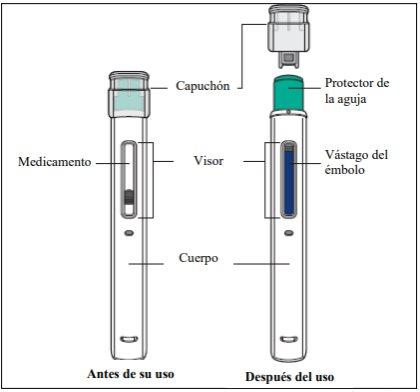
Figure A
Do not use the pre-filled pen if:
- it is cracked or damaged.
- the expiration date has passed.
- it has been dropped onto a hard surface.
Do not remove the cap until you are ready for injection. Keep Yuflyma out of the reach of children.
Pre-filled pen 1 alcohol swab Not included in the box:
| |
Figure B |
Do not use the pre-filled pen if:
|
Figure C |
|
Figure D |
|
Figure E |
|
Figure F |
|
Figure G |
|
Figure H |
|
Figure I |
|
Figure J |
|
Figure K
Figure L |
|
Figure M |
|
- Country of registration
- Active substance
- Prescription requiredYes
- Manufacturer
- This information is for reference only and does not constitute medical advice. Always consult a doctor before taking any medication. Oladoctor is not responsible for medical decisions based on this content.
- Alternatives to YUFLYMA 80 mg SOLUTION FOR INJECTION IN PRE-FILLED PENDosage form: INJECTABLE, 20 mgActive substance: adalimumabManufacturer: Amgen Europe B.V.Prescription requiredDosage form: INJECTABLE, 20 mgActive substance: adalimumabManufacturer: Amgen Europe B.V.Prescription requiredDosage form: INJECTABLE, 40 mgActive substance: adalimumabManufacturer: Amgen Europe B.V.Prescription required
Online doctors for YUFLYMA 80 mg SOLUTION FOR INJECTION IN PRE-FILLED PEN
Discuss questions about YUFLYMA 80 mg SOLUTION FOR INJECTION IN PRE-FILLED PEN, including use, safety considerations and prescription review, subject to medical assessment and local regulations.
Frequently Asked Questions





